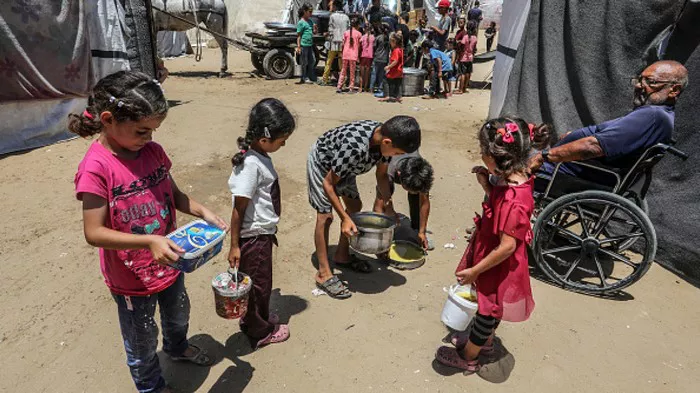The ongoing conflict in Gaza has created a dire humanitarian crisis, leading to a severe shortage of essential supplies, including baby formula. Infants and children are among the most affected, with families struggling to find milk and formula.
In interviews with The New Arab, several Palestinians in Gaza shared their experiences. Baby milk and formula have become scarce, forcing parents to search for days or even weeks, often at exorbitant prices.
Rewaa Asaad, a 27-year-old mother of three, is sheltering in a tent in al-Mawasi in Khan Younis. She faces immense difficulties in obtaining formula for her four-month-old daughter. Asaad’s premature delivery, triggered by the stress of war, left her unable to breastfeed. She said, “Due to the lack of food and water, my body lost all vitamins, and I was no longer able to produce natural milk. My baby and I both suffer from hunger.”
Her husband, Ahmed Asaad, searches pharmacies and markets for formula, even turning to the black market, but he cannot afford the high prices. “We have experienced all kinds of torment in this war. There are no elements of survival,” he lamented.
Since October, Israel has imposed a strict blockade on Gaza, preventing the delivery of food, water, and essential supplies. The Palestinian Ministry of Health in Gaza reports that over 90% of children in the enclave suffer from malnutrition and starvation due to the severe shortage of baby formula and basic food supplies.
The scarcity of basic materials has driven up prices, making it difficult for most Palestinians, many of whom lack a regular income, to afford necessities. This forces parents to resort to inadequate and sometimes unsafe alternatives.
In Beit Hanoun, Mufida Abu Shamala feeds her infant daughter solid foods because she cannot find baby formula. “I know we are doing something harmful to her, but there is nothing else. She cries all the time,” she said.
Shaimaa Al-Amsi, another displaced woman, gives her child milk intended for older children, provided by UNRWA. “It is not good for my child, but we have no other option,” she explained.
Dr. Emad al-Hamas, a Palestinian doctor based in Rafah, warned about the health risks of using unsuitable food alternatives for infants. “Using unhealthy alternatives can lead to constipation, digestive problems, and malnutrition in children,” he said.
International organizations have warned that most of Gaza’s 2.3 million residents are displaced and living in harsh conditions. The Director-General of the World Health Organization, Tedros Adhanom, stated that a significant portion of Gaza’s population faces catastrophic food shortages, nearing famine levels.
Malnutrition has resulted in the deaths of 37 people, including 28 children under five. Over 8,000 children under five have been diagnosed with severe malnutrition, with 1,600 suffering from chronic malnutrition. Due to security concerns, only two centers in Gaza can treat or stabilize patients with severe malnutrition.


